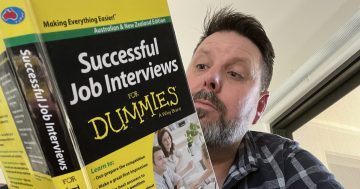Rachel Pelta* outlines six questions aspiring employees should as during a remote job interview.
 A remote job interview follows the same format as most other interviews.
A remote job interview follows the same format as most other interviews.
Eventually, though, the tables will turn and you get to ask the questions.
While there are questions you should ask, the only way to get more information about the “remote” aspects is to ask remote-specific questions.
Here are six questions you should ask your remote interviewer.
- What are the remote work policies for this position?
Whether the company is fully remote or you’re the first remote employee, you’ll want to be clear on the expectations and policies of working remotely in this particular position.
Determine whether you will be working 100 per cent remotely or if you need to come into the office occasionally after the pandemic.
Do you need to work a standard nine to five schedule, or will you have flexibility?
- How does your team communicate?
Communication is a huge part of successful remote work.
Gaining insight into how the company communicates and what sorts of remote communication tools it uses will help you assess how connected you’ll be.
Perhaps employees are big on video meetings, or maybe you’ll primarily use Slack.
It might be a red flag if your interviewer lacks a good answer to this question. You want to be sure the company values keeping remote workers in the know and connected to other remote workers or any in-office counterparts.
- Where is everyone located, and what are the response expectations?
Remote work integration varies across the board.
As we know, the pandemic accelerated the growth of virtual work but some companies are only working remotely during the pandemic, whereas other companies were already remote friendly.
It’s important that you gain an understanding of how your colleagues work virtually so that you have direction on communication expectations.
Some remote companies have a “work-from-anywhere” policy, which means when you’re sleeping someone could be working, and vice versa.
How does the company handle asynchronous communication? What are the expected response times? What if it’s an emergency? And, how are meetings scheduled across multiple time zones?
Any company that lets its employees work remotely will need to have clear policies in place for dealing with geographical and time differences.
- How will I be get feedback?
See if the company has an annual or biannual review process and determine how you’ll get feedback from your boss.
Are there performance goals you have to meet? How does the company measure and define success?
If there isn’t a clear plan, decide if you can work in a job that may lack structure, praise, and constructive criticism.
That said, you can always suggest meeting frequently with your boss to review current projects and to discuss feedback.
- What does a successful remote worker look like to you?
In your remote job interview, ask what it takes to be a successful virtual worker.
Perhaps the company values proactive communication, a certain level of output, or someone who works at their desk nine to five each day.
Gauge the interviewer’s response to this question with what you’re looking for in a remote job.
Are you able to perform at a level that is acceptable and considered successful in this particular company?
If so, you’ll be heading into the job knowing just what they’re looking for.
- What’s the onboarding/orientation process?
Find out if the company has a clear and concise plan for starting all new employees.
Is there a plan already in place for new employees? Or, will they at least create one for you?
Like any job, a thorough orientation for new staff is essential to help them feel welcome and teach them how the company does things.
It’s even more important for remote employees since you can’t just pop into HR and ask your questions.
The Right Questions, the Right Answers
Asking questions at the end of a job interview can help you fill in any gaps and determine if this job is truly the best match for your career goals.
Asking remote-specific questions can help you figure out if this is the right remote role—and company—for you.
*Rachel Pelta is a Content Coordinator for FlexJobs. With professional experience in job placement and as a manager, she creates content to help people succeed in their job search, and to help managers get the best out of their staff.
This article first appeared at flexjobs.com.











